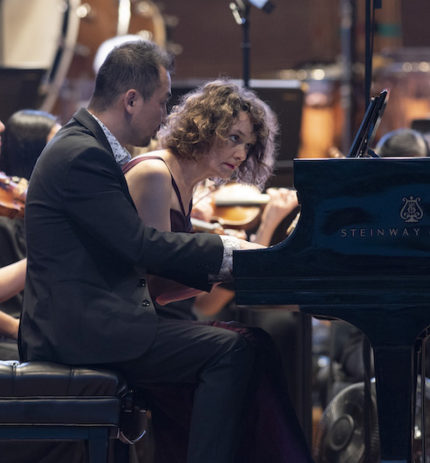Grant Park’s belated Vine premiere proves so-so with ZOFO

The world premiere of Australian composer Carl Vine’s Zofomorphosis had originally been billed for the second week of this summer’s Grant Park Orchestra season in June. However, when music director Carlos Kalmar tested positive for Covid after the afternoon dress rehearsal the program had to be revised just hours before the performance. Stephen Alltop stepped in at the eleventh hour to conduct that night, but the Vine premiere was a necessary casualty.
Ultimately, the work was able to be rescheduled for the season’s closing week, and received its premiere Wednesday night, when the piano duo ZOFO—pianists Eva-Maria Zimmermann and Keisuke Nakagoshi—returned to debut the work that had been written for them.
“ZOFO” is an acronym for “20-finger orchestra,” with “20” rendered as “ZO.” In his written comments, Vine remarks that Zofomorphosis explores the sonic possibilities when this 20-finger orchestra joins a full symphonic ensemble. Still, Wednesday’s premiere left one wondering if these promising resources had been truly explored to their fullest.
The 20-minute work is cast in three clearly defined movements. In the outer sections, a headlong, motoric feeling prevails, while the slower middle movement is wandering and ethereal. The faster music distinctly recalls Prokofiev, and the dreamier portions evoke Poulenc. One could not help avoid the sense this has been done before, and more convincingly.
Zimmermann and Nakagoshi were wholly committed to the score nonetheless. Their playing was incisive, and they were engagingly in sync with Kalmar’s assured leadership of their orchestral colleagues. Zimmermann took the top part for the first two movements, but the pair executed a quick change of seats to give Nakagoshi the treble lines for the closing tarantella. ZOFO was dynamic in the raucous cadenza near the work’s end, and their joint showmanship was warmly received by the audience.
Wednesday night an enormous screen was placed behind the orchestra, with various camera angles panning among players throughout the concert. While this was distracting at times—its size and central placement means you cannot avoid it like the peripherally placed screens at Ravinia—it was interesting to see ZOFO’s interactions with Kalmar close up. Too bad there was apparently no camera focused on the duo’s hands.
The program began with two suites of music inspired by fairy tales: Tchaikovsky’s Suite from Sleeping Beauty and Josef Suk’s Fairy Tale.
The orchestra shined in the Tchaikovsky. Kalmar led a well-characterized Introduction depicting the good and evil fairies, and helped his players spin the endless, amorous suitors’ lines in the Adagio. For reasons unspecified, the amusing section that depicts Puss-in-Boots and the White Cat was omitted (though it was printed in the program), but the flowing tenderness of the Panorama immediately moved one past this confusion. The final Waltz went with grand spirit and a palpable sense of happily ever after.
Josef Suk’s Fairy Tale is a four-movement suite excerpted from music he composed to accompany a play by Julius Zeyer that depicts the misfortunes of a prince and princess from rival families who fall in love. The lushly romantic opening movement, “About the Constant Love of Raduz and Mahulena and Their Trials,” features a soaring melody for solo violin. Dima Dimitrova was in the concertmaster seat, where her playing sounded a bit tentative for the music’s unabashed expression, though she played with poise and elegant phrasing.
Two intermezzi follow, “Playing at Swans and Peacocks,” and “Funeral Music.” The former is a jaunty military polka, while the latter is a sombre evocation of grief, with lurching, close dissonances. In the closing movement, “Runa’s Curse and How It was Broken by True Love,” the violin theme from the first movement returns with grandeur in the full orchestra. Kalmar made an excellent case for this stop on what he called the Grant Park “discovery tour,” though Suk did suffer from the unavoidable comparison with Tchaikovsky’s exquisite ballet music.
The Grant Park Orchestra closes its season with Carlos Kalmar leading performances of Haydn’s The Creation 6:30 p.m. Friday and 7:30 p.m. Saturday. grantparkmusicfestival.com
Posted in Uncategorized

